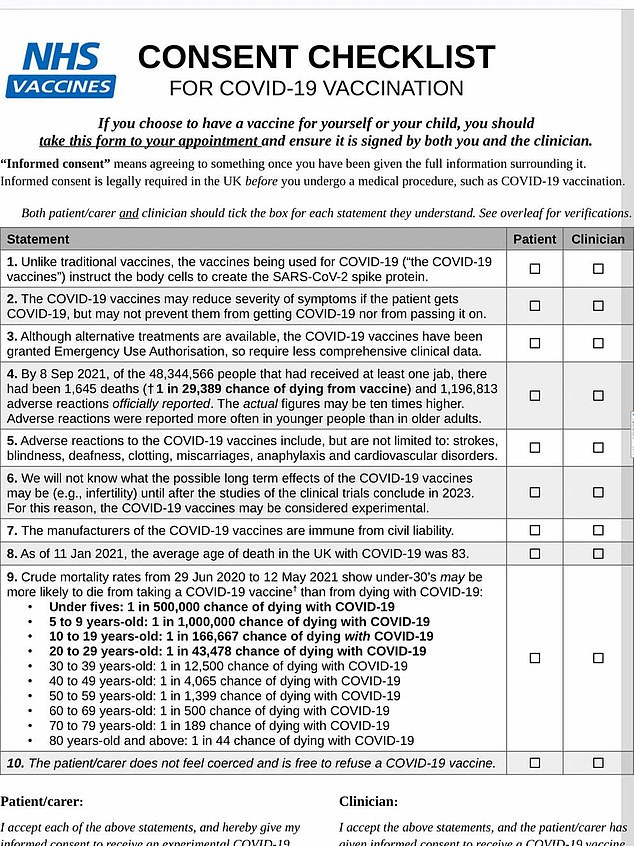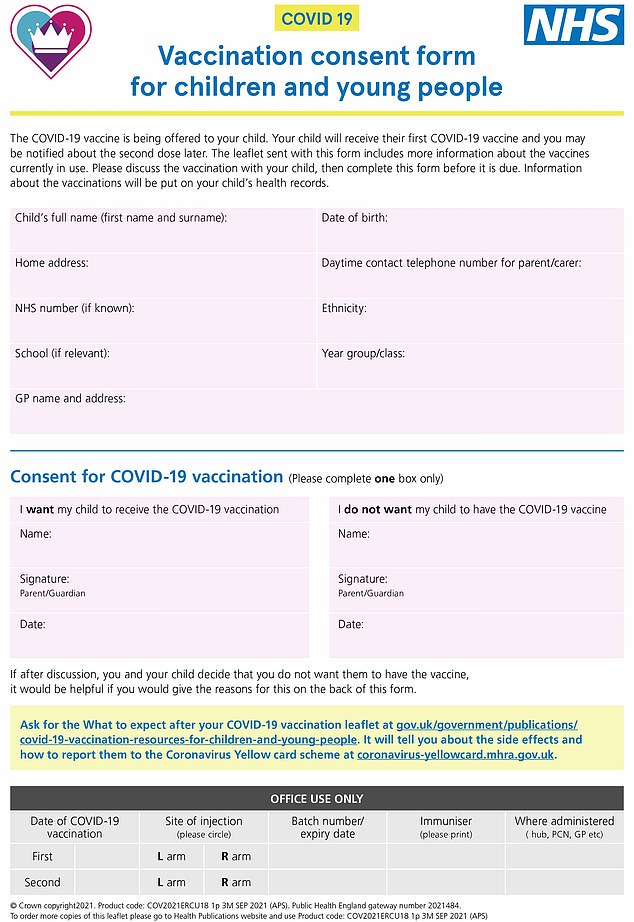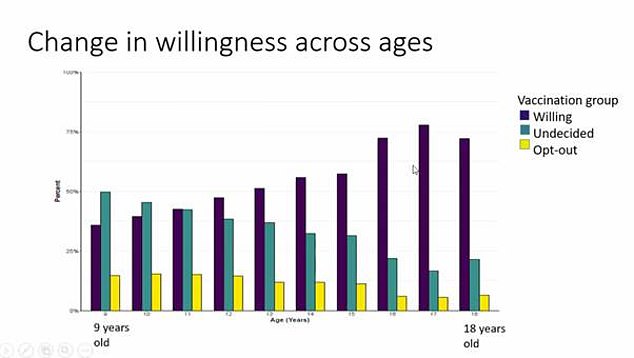Parents and teachers have been warned about a hoax Covid vaccine consent form being circulated in schools and online.
The letter, which includes a fake NHS logo, contains a ‘consent checklist’ and makes a number of false assertions about the jab.
They include bogus claims that the vaccine can cause miscarriages and blindness and that it’s still deemed ‘experimental’.
Parents revealed they had been sent the form via email and told to give it to their children before their vaccination appointment.
Some head teachers also reportedly received the letter and were asked to share it with their students. An NHS England boss took to Twitter last night to denounce the letter as illegitimate.
The UK started vaccinating healthy 12 to 15-year-olds with a single dose of Pfizer’s vaccine for the first time last week.
It did so despite originally not getting the blessing from No10’s vaccines advisory panel, which said the health benefit to youngsters was ‘marginal’.

FAKE CONSENT FORM: Parents and teachers have been warned about a hoax Covid vaccine consent form being circulated in schools and online. The letter, which includes a fake NHS logo, contains a ‘consent checklist’ and a number of false assertions about the jab

REAL CONSENT FORM: The legitimate version available on the NHS England website
The Joint Committee for Vaccination and Immunisation (JCVI) left the decision to Chris Whitty and the chief medical officers in the devolved nations.
They signed off on the plans on the basis it could prevent hundreds of thousands of school absences.
Parent Ruth Moss, from Merseyside, posted a picture of one of the fake consent checklists on Twitter.
NHS England medical director for Covid immunisation Dr Jonathan Leach replied: ‘Just to confirm that this is not a legitimate NHS form.’
It comes after the biggest survey of its kind suggested just half of children in England want a Covid vaccine.
Researchers surveyed more than 27,000 nine to 18-year-olds across the country earlier this year ahead of the move to jab healthy secondary school pupils.

Younger children were less willing to get vaccinated than older teenagers, of whom the majority said they would accept a jab. Youngsters who had previously tested positive or believe that they had Covid already were more likely to decline a vaccine

Researchers surveyed more than 27,000 nine to 18-year-olds across the country earlier this year ahead of the controversial plans to jab healthy school pupils. Exactly 50 per cent were willing to have the vaccine, while a third (37 per cent) were undecided and 13 per cent wanted to opt out

Fourteen-year-old Jack Lane became one of the first to benefit from the extension of Britain’s jab rollout to children last week at Belfairs Academy in Leigh-on-Sea, Essex
Teachers should phone police to deal with anti-vaxxers at school, official guidance
Teachers have been told not to hesitate in phoning police to deal with anti-Covid vaccine campaigners amid fears of protests at school gates during the jab rollout in schools.
Pfizer’s jab was approved for 12 to 15-year-olds earlier this month, and within hours of the announcement pressure groups had already threatened action.
National guidance says if headteachers catch wind that a protest is being staged on school grounds they should ‘alert the local authority and police’.
Previous anti-lockdown and vaccine protests have seen streets shut in London’s city centre and projectiles launched at the Houses of Parliament.
Jabs are being administered by School Age Immunisation Service (SAIS) teams that already carry out routine vaccine programmes for things like flu.
Schools will be used as a site for administering the vaccines and distributing consent and information forms to pupils and guardians.
Advertisement
Exactly 50 per cent were willing to have the vaccine, while a third (37 per cent) were undecided and 13 per cent wanted to opt out.
Younger children were less willing to get vaccinated than older teenagers, of whom the majority said they would accept a jab.
Youngsters who had previously tested positive or believed that they had survived Covid already were more likely to decline a vaccine.
The research was carried out by the University of Oxford, University College London (UCL) and the Cambridge University.
Among the main authors were UCL’s Professor Russell Viner and Professor Sir Andrew Pollard of Oxford, who sit on influential panels advising No10.
Overall, more than a million under-18s have been jabbed so far, including children who were prioritised earlier on in the vaccine drive because they have underlying conditions.
The latest survey was carried out in schools across Berkshire, Buckinghamshire, Oxfordshire and Merseyside between May and July this year.
Students who were more hesitant about getting the jab were also more likely to spend longer on social media, attend schools in deprived areas, and feel as though they did not identify with their school community, the study found.
Researchers are calling for more resources and information about the benefits and risks of vaccination to be provided to children to help inform their decision.
They said they were open to the idea of collaborating with social media platforms like TikTok and using influencers to get the messaging across.
Sir Andrew, director of the Oxford Vaccine Group, said: ‘Given the huge disruption that has happened in education and for children, I think this study is really important because it’s highlighting that we’ve actually missed this really important group in making sure they have access to information.
‘And of course they don’t access their information by reading the newspaper or watching broadcast news. A lot of it is through social media.’
He added: ‘We have some work to do in order to improve that.’
Dr Mina Fazel, an expert in child and adolescent psychiatry at Oxford, said: ‘The young people we’ve spoken to are saying that we need to use social media channels.
‘Maybe celebrities getting involved might be a route that they would listen to more.’
She added: ‘I’m also very interested in how to use TikTok. We open the door to any kind of influencers – major influencers, minor influencers – who want to learn more about these findings in order to provide information in their medium.’
Source link : https://www.dailymail.co.uk/news/article-10036833/NHS-England-medical-director-warns-parents-against-hoax-Covid-vaccine-letters.html











